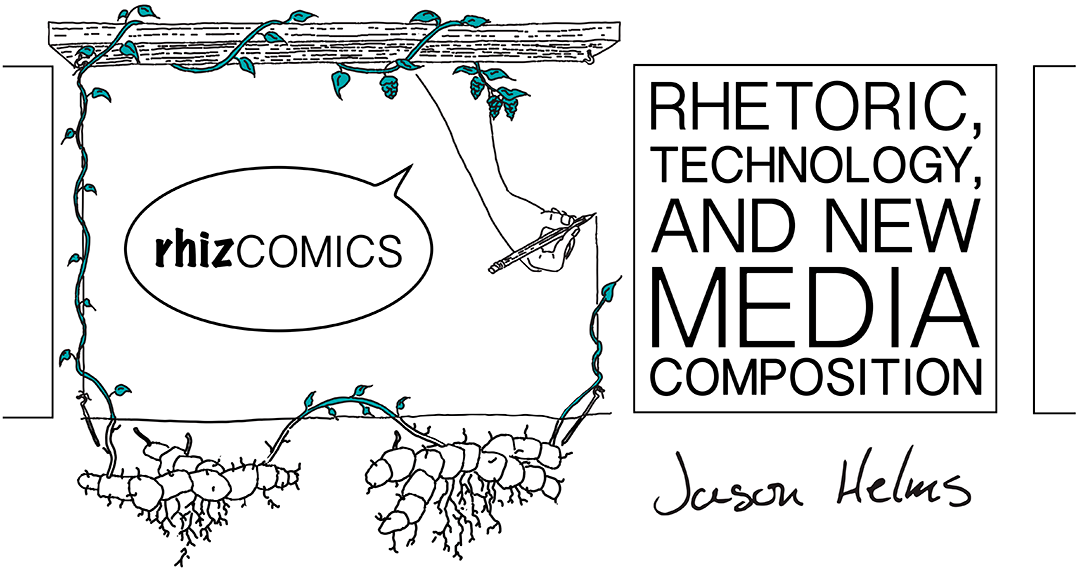
Rhizcomics: Rhetoric, Technology, and New Media Composition
Jason Helms
Open Access February 2017
ISBN 978-0-472-90069-5
Explores comics’ role as an exemplar of new, rich, decentered ways of thinking about creating narratives.
Rhizcomics is a digital monograph that composes multimodal arguments about rhetoric and comics. The book presents comics as a rhetorically complex medium capable of nuanced scholarly arguments. Relying on animation, drawing, video, interactivity, and text, Rhizcomics investigates presymbolic rhetoricity across comics and other media.
Published by the University of Michigan Press and the Sweetland Digital Rhetoric Collaborative as an open access digital monograph.
Jason Helms is an associate professor of English at TCU where he teaches courses on rhetorical theory, writing, video games, and comics.
What others are saying about Jason Helms’ Rhizcomics :
“Rhizcomics is a brilliant book, a statement that it immediately complicates. Is it a book, a project, a work, an experience? Rhizcomics is all of these things, and it breaks new ground in how scholars of rhetoric and composition present theory and research. Jason Helms’ argument that comics offer a new “idiom” for understanding the complicated relationship between image and text is compelling enough, but he dazzles his readers by disrupting our expectations. We are invited to not only follow Helms’ argument but to blaze our own way through on a multimodal journey, taking inviting detours, playing with animations, and even reading out of order. Rhizcomics is a visual and verbal feast, much as comics are, and is both argument and metaphor. I’ve never seen anything like it.”
Bruce Ballenger, Professor of English, Boise State University, and author of The Curious Writer (Pearson, 2014) The Curious Researcher (Pearson, 2012), and Crafting Truth: Short Studies in Creative Nonfiction (Pearson, 2010).
“With Rhizcomics, Jason Helms provides an accessible theory of how the visual and the verbal elements in comics function rhetorically, and he does so by using the affordances both of comics and in the form of the digital monograph he has produced. Dr. Helms successfully uses design as a key and integral element in making arguments throughout the text; the work thus bridges the theory-practice divide that often troubles more traditional print-locked analyses of visual and digital media. The degree of interactivity that is built in should serve as a model for future digital monographs – from the invitation to engage the features of the text, such as interactive animations and hypertextual reading paths to the extension of the scholarly conversation by including both comment sections and the integration of social annotation.”
Douglas Eyman, Associate Professor of Writing and Rhetoric, George Mason University, and author of Digital Rhetoric: Theory, Method, Practice (U of Michigan P, 2015)
“Helms pushes the boundaries of scholarly publishing, bringing together many different disciplinary traditions, from familiar continental theorists to ancient, modern, and postmodern rhetoricians, to comics and contemporary composition theorists . . . I haven’t seen an online project like this that tackles difficult theoretical concepts in an engaging way, and invites audience participation.”
Sarah Arroyo, Associate Professor of English, California State University, Long Beach, and author of Participatory Composition: Video Culture, Writing, and Electracy (Southern Illinois UP, 2013)
“Ambitious in its scope, this project will have an important impact both on the field of rhetorical studies, and more broadly.”
Collin Brooke, Associate Professor of Writing and Rhetoric, Syracuse University, and author of Lingua Fracta: Toward a Rhetoric of New Media (Hampton, 2009)
“Helms conveys his analysis of comics in a refreshingly lively mode: both in his expert-but-accessible scholarly voice and in the ambitious, rhizomatic composition he’s chosen to pursue. If, as he argues, ‘comics must be approached as rhizomes with middles everywhere and no center to be found,’ then so too modern scholarship has much to gain from the many forms of commentary, asides, marginalia, and inserts that enrich and constitute this text.”
Helen J. Burgess, Associate Professor of English, North Carolina State University, editor of Hyperrhiz: New Media Cultures, co-editor of Electric Press, and co-author of Highways of the Mind (Penn P, 2015)

